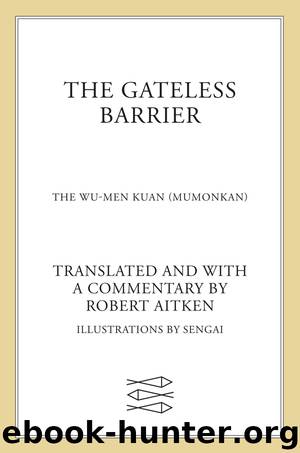The Gateless Barrier by Robert Aitken

Author:Robert Aitken
Language: eng
Format: epub
ISBN: 9781466895461
Publisher: Farrar, Straus and Giroux
CASE 26
Fa-yen: Two Monks Roll Up the Blinds
THE CASE
The great Fa-yen of Ch’ing-liang took the high seat before the midday meal to preach to his assembly. Raising his hand he pointed to the bamboo blinds. Two monks went and rolled them up in the same manner. Fa-yen said, “One gains; one loses.”
WU-MEN’S COMMENT
Tell me, which one gained? Which one lost? If you have the single eye regarding this, you will see where the National Teacher Ch’ing-liang failed. But I must warn you strictly against arguing gain and loss.
WU-MEN’S VERSE
When they are rolled up the great sky is bright and clear,
but the great sky still does not match our Way.
Why don’t you throw away that sky completely?
Then not a breath of wind will come through.
Fa-yen (Hōgen) is revered as the last great founder of T’ang Buddhism, for his Fa-yen school was the fifth of the five principal Zen traditions. His dates are 885 to 958, so his time extended beyond the end of the T’ang period and through the Five Dynasties. His original teacher was Ch’ang-ch’ing (Chōkei), a brother monk of Yün-men, but he changed teachers in a memorable episode:
Ti-tsang asked Fa-yen, “What is your journey?”
Fa-yen said, “Going around on pilgrimage.”
Ti-tsang said, “What do you expect from pilgrimage?”
Fa-yen said, “I don’t know.”
Ti-tsang said, “Not knowing is most intimate.”1
Ti-tsang (Jizō) was Fa-yen’s cousin in the Dharma but became his teacher forthwith. “Not knowing is most intimate” brought Fa-yen directly to the Bodhi Tree, though not, it seems, to the Buddha’s own experience:
Next day Fa-yen prepared to set off again on his pilgrimage. Ti-tsang walked with him to the gate, and as they passed through the garden Ti-tsang pointed to a boulder and said, “Most monks say that the Three Worlds exist because of the mind and all phenomena arise from recognition. Tell me, does that stone exist in the mind or outside?”
Fa-yen said, “In the mind.”
Ti-tsang said, “That stone will be very heavy for you to carry about in your mind.”2
With this Fa-yen realized that he was not as enlightened as he thought, so he remained with Ti-tsang for further training and ultimately became his Dharma successor.
Quite a lot can be said about these two Dharma exchanges. First of all, it is clear that Fa-yen was on pilgrimage before he had very much understanding. Most modern teachers discourage their students from drifting from teacher to teacher in early phases of their practice. They reason that such beginners might get confused by the different teachings, and this is probably true. Yet a new setting and a new method can sometimes be stimulating, as it was for Fa-yen, and I have even suggested on occasion that a student might do better working with somebody else. This kind of careful exploration is very different from casual hopping around, of course.
Second, note that Ti-tsang did not hesitate to engage in a Dharma dialogue with someone else’s student. Today teachers in Japan, at least, will not usually do this, out of respect for the process the student has begun with the original teacher.
Download
This site does not store any files on its server. We only index and link to content provided by other sites. Please contact the content providers to delete copyright contents if any and email us, we'll remove relevant links or contents immediately.
The remains of the day by Kazuo Ishiguro(8986)
Tools of Titans by Timothy Ferriss(8373)
Giovanni's Room by James Baldwin(7334)
The Black Swan by Nassim Nicholas Taleb(7118)
Inner Engineering: A Yogi's Guide to Joy by Sadhguru(6788)
The Way of Zen by Alan W. Watts(6608)
The Power of Now: A Guide to Spiritual Enlightenment by Eckhart Tolle(5767)
Asking the Right Questions: A Guide to Critical Thinking by M. Neil Browne & Stuart M. Keeley(5766)
The Six Wives Of Henry VIII (WOMEN IN HISTORY) by Fraser Antonia(5509)
Astrophysics for People in a Hurry by Neil DeGrasse Tyson(5185)
Housekeeping by Marilynne Robinson(4438)
12 Rules for Life by Jordan B. Peterson(4300)
Double Down (Diary of a Wimpy Kid Book 11) by Jeff Kinney(4265)
Ikigai by Héctor García & Francesc Miralles(4262)
The Ethical Slut by Janet W. Hardy(4251)
Skin in the Game by Nassim Nicholas Taleb(4244)
The Art of Happiness by The Dalai Lama(4126)
Skin in the Game: Hidden Asymmetries in Daily Life by Nassim Nicholas Taleb(3997)
Walking by Henry David Thoreau(3956)
